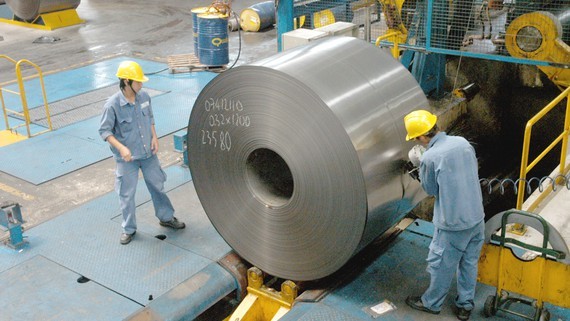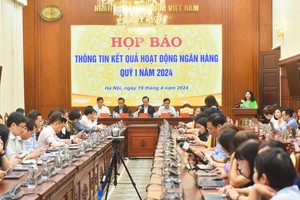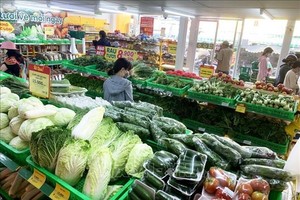
In the first months of this year, export price of steel merely reached an average of US$650 per ton, down more than 12 percent over the same period last year. This showed that pressure of competition in price on global market has been causing export turnover of the steel and iron industry to drop drastically. Due to the ongoing trade tensions between major countries, price pressure of the steel and iron industry will remain unpredictable and tend to be extremely difficult. As for export market, most of familiar trade partners of Vietnam’s steel and iron industry, including Cambodia, Indonesia or Malaysia, still ensured production though there was no breakthrough in growth. However, exports of steel and iron to the US market saw a sharp decline of more than 42 percent in volume and more than 46 percent in value.
At the present, steel exports to the US market account for nearly 9 percent of total steel exports. Meanwhile, export proportion to this market touched 14 percent last year. Noticeably, key steel products being exported to the US were cold-rolled steel, corrugated galvanized iron and color coated roofing sheets, accounting for around 80-85 percent. According to the Vietnam Steel Association (VSA), consumption of steel encountered many difficulties, leading to a sharp drop of about 50 percent in exports over the same period last year because of impacts of the trade war between the US and China. On the contrary, Vietnam has spent over $5 billion to import steel of all kinds, an increase of 14 percent in volume and 7 percent in value over the same period last year. Of which, steel and iron imported from China was highest, accounting for 42 percent of total volume and around 40 percent of total steel imports of Vietnam.
‘Noticeably, Chinese boron steel was heavily imported into Vietnam and sold at low prices, causing domestic construction steel market to face difficulty in consumption as supply highly exceeded demand,’ said the representative of VSA.
According to vice chairman of VSA Trinh Khoi Nguyen, since the beginning of this year, domestic steel industry has faced several difficulties due to cutthroat competitive pressure caused by increasing domestic supply and cheap steel imported from China. In addition, excessive steel supply in the world has also been causing uncertainties in steel market, including Vietnam. Statistics by VSA showed that since 2018, supply had highly exceeded demand which prompted domestic steel plants to run at around 60 percent of their capacities. There is not any steel plant running at full capacity. Moreover, the fact that some large steel projects continued to be put into operation this year has made excessive supply to be more serious. Amid the current pressure, in short term, VSA proposed the Government not to approve and grant permission for new projects of steel products with excessive supply, including hot/cold rolled steel, construction steel, corrugated galvanized iron and color coated roofing sheets. VSA warned that it is not necessary for enterprises to invest more during this period.
Besides, authorities should promulgate standards and regulations as technical barriers for imported steel products. They should also have policies to prevent foreign investment, including those from China, from bringing into Vietnam unsuitable, energy-consuming and polluting technologies like induction furnaces for steelmaking.
‘In the opinion of VSA, amid the tendency of global economic integration, the fact that countries use trade remedies is a regular and timely action to protect domestic production. At the same time, they also should follow regulations of WTO,’ said Mr. Nguyen.
Sharing the same point of view, CEO of Thep Viet Company, Do Duy Thai said that bringing out trade remedies is not to fight with the outside world to receive preferential import tariffs but to create barriers to protect domestic production and market. He cited that the US is considered to be free in trade, but it still has to protect its domestic market by anti-dumping measures. Especially, the US considers protecting domestic market to be more important than exporting. This has brought success to the country. Therefore, the first and foremost important thing at this time is the role of the Government in protection of local enterprises by trade remedies. Although there will be consequences, they will not be significant. It is important that whether Vietnamese steel products meet global quality and are able to compete with global steel prices or not.
At the present, steel exports to the US market account for nearly 9 percent of total steel exports. Meanwhile, export proportion to this market touched 14 percent last year. Noticeably, key steel products being exported to the US were cold-rolled steel, corrugated galvanized iron and color coated roofing sheets, accounting for around 80-85 percent. According to the Vietnam Steel Association (VSA), consumption of steel encountered many difficulties, leading to a sharp drop of about 50 percent in exports over the same period last year because of impacts of the trade war between the US and China. On the contrary, Vietnam has spent over $5 billion to import steel of all kinds, an increase of 14 percent in volume and 7 percent in value over the same period last year. Of which, steel and iron imported from China was highest, accounting for 42 percent of total volume and around 40 percent of total steel imports of Vietnam.
‘Noticeably, Chinese boron steel was heavily imported into Vietnam and sold at low prices, causing domestic construction steel market to face difficulty in consumption as supply highly exceeded demand,’ said the representative of VSA.
According to vice chairman of VSA Trinh Khoi Nguyen, since the beginning of this year, domestic steel industry has faced several difficulties due to cutthroat competitive pressure caused by increasing domestic supply and cheap steel imported from China. In addition, excessive steel supply in the world has also been causing uncertainties in steel market, including Vietnam. Statistics by VSA showed that since 2018, supply had highly exceeded demand which prompted domestic steel plants to run at around 60 percent of their capacities. There is not any steel plant running at full capacity. Moreover, the fact that some large steel projects continued to be put into operation this year has made excessive supply to be more serious. Amid the current pressure, in short term, VSA proposed the Government not to approve and grant permission for new projects of steel products with excessive supply, including hot/cold rolled steel, construction steel, corrugated galvanized iron and color coated roofing sheets. VSA warned that it is not necessary for enterprises to invest more during this period.
Besides, authorities should promulgate standards and regulations as technical barriers for imported steel products. They should also have policies to prevent foreign investment, including those from China, from bringing into Vietnam unsuitable, energy-consuming and polluting technologies like induction furnaces for steelmaking.
‘In the opinion of VSA, amid the tendency of global economic integration, the fact that countries use trade remedies is a regular and timely action to protect domestic production. At the same time, they also should follow regulations of WTO,’ said Mr. Nguyen.
Sharing the same point of view, CEO of Thep Viet Company, Do Duy Thai said that bringing out trade remedies is not to fight with the outside world to receive preferential import tariffs but to create barriers to protect domestic production and market. He cited that the US is considered to be free in trade, but it still has to protect its domestic market by anti-dumping measures. Especially, the US considers protecting domestic market to be more important than exporting. This has brought success to the country. Therefore, the first and foremost important thing at this time is the role of the Government in protection of local enterprises by trade remedies. Although there will be consequences, they will not be significant. It is important that whether Vietnamese steel products meet global quality and are able to compete with global steel prices or not.
























